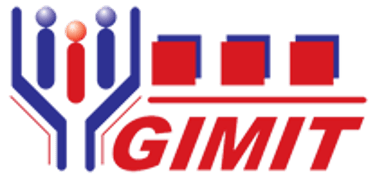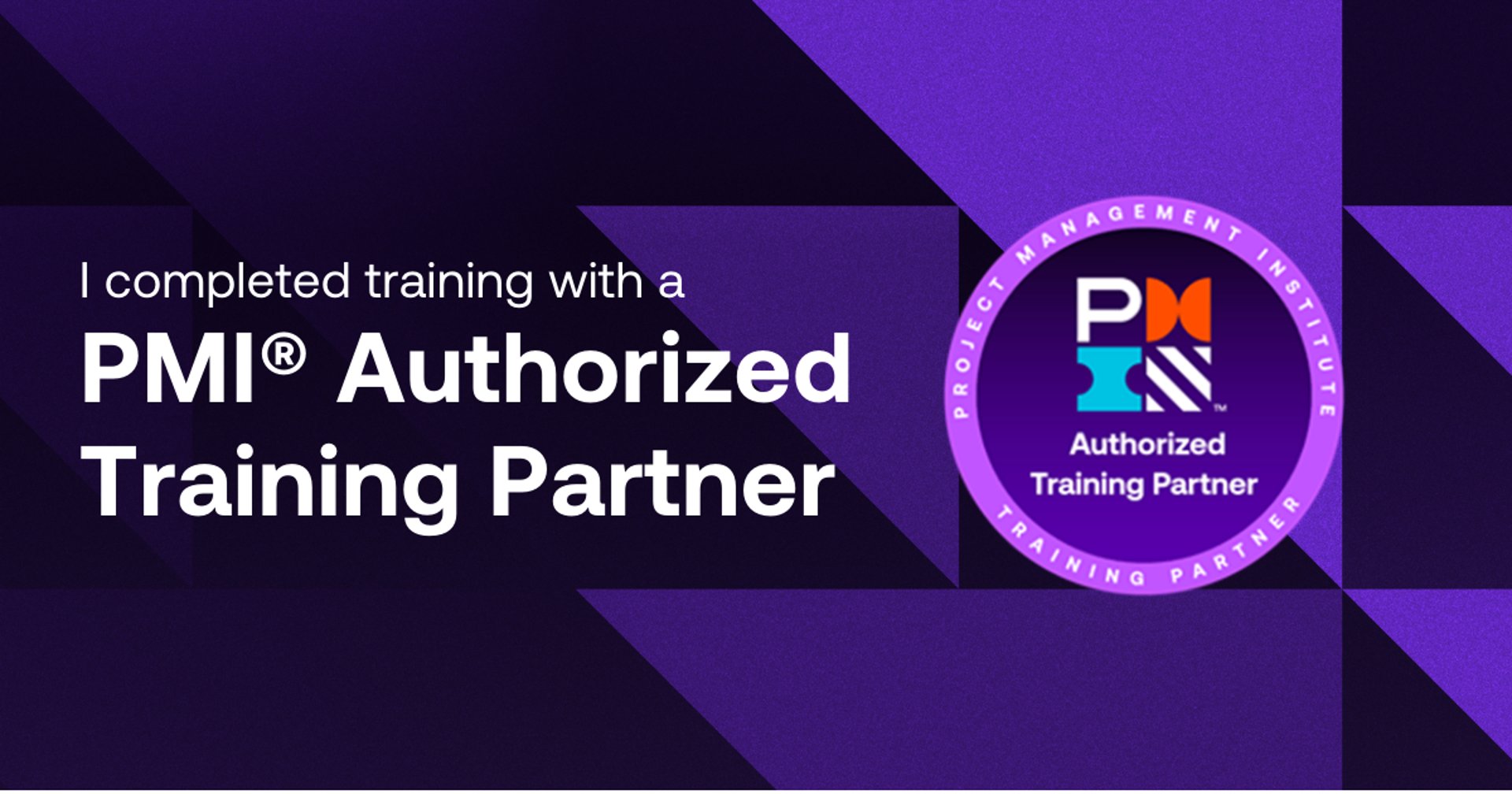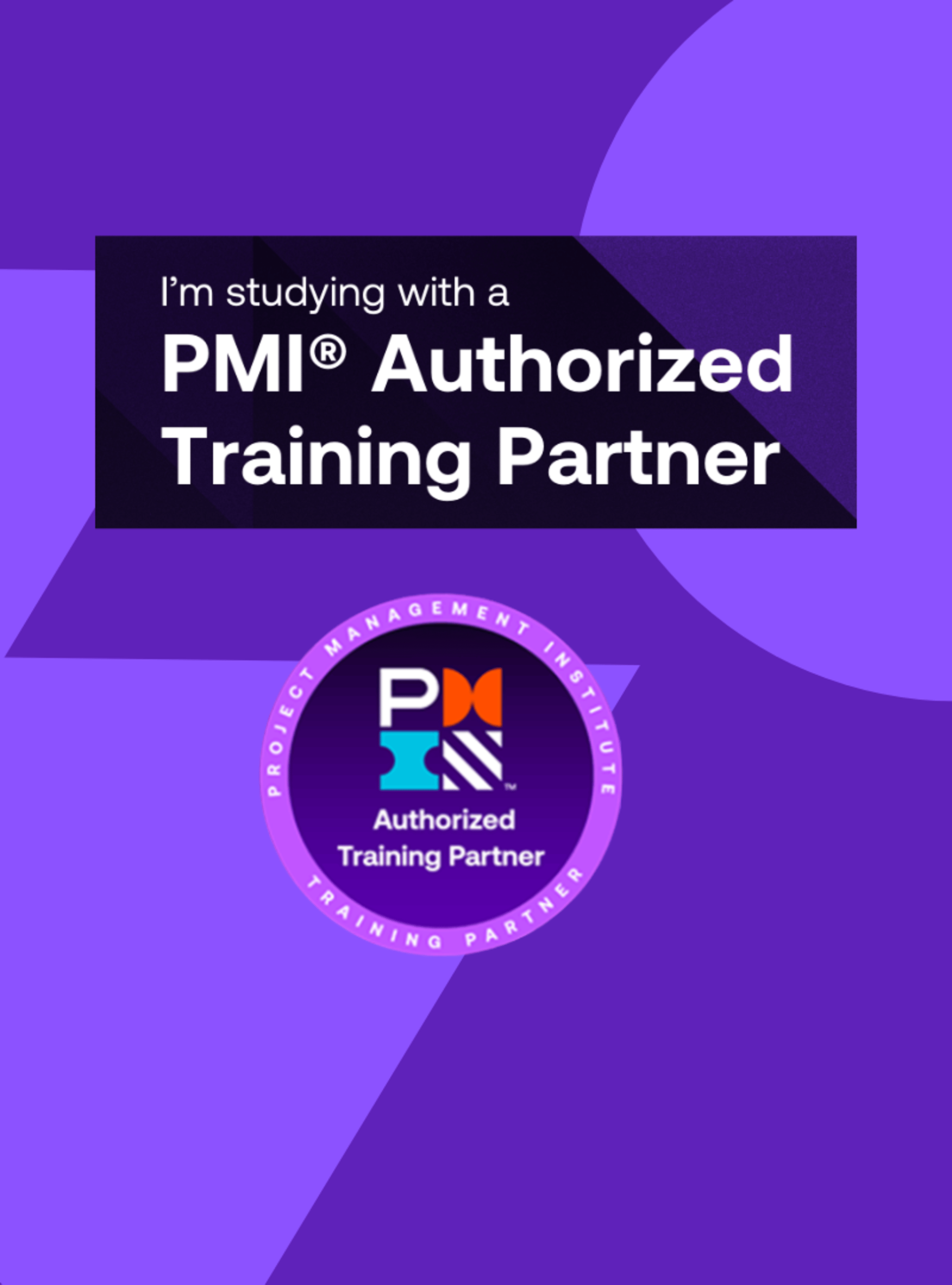
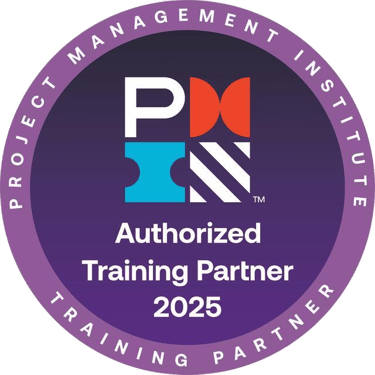

Project Management Professional (PMP)
Master the golden standard for project management in our 30-day PMI Authorized PMP® Live Sprint, gaining global recognition and driving results.
Upcoming Bootcamp:
PMI Certified Mentors:

Mohit
10+ years experience in Project Management


Project Management Professional (PMP)
Master the golden standard for project management in our 30-day PMI Authorized PMP® Live Sprint, gaining global recognition and driving results.
Upcoming Bootcamp:
PMI Certified Mentors:
Mohit
10+ years experience in Project Management
Industries Leading the Demand for PMP Professionals
🎯Course Description:
Ready to transition from managing single projects to leading complex strategic initiatives? GIMIT, an authorized training partner of PMI, offers a comprehensive PMP course specifically designed for experienced project managers aspiring to become Program Management Professionals.
This project management professional course goes beyond traditional project management, focusing on the intricacies of overseeing multiple, interdependent projects to achieve larger organizational objectives. You'll gain mastery in:
Program Lifecycle Management: Understand the entire journey of a program from initiation to closure.
Stakeholder Engagement: Learn advanced techniques for effectively managing diverse stakeholders across various projects.
Program Governance: Develop skills in establishing and maintaining robust governance frameworks.
Benefits Realization: Master the art of delivering tangible benefits and value aligned with strategic goals.
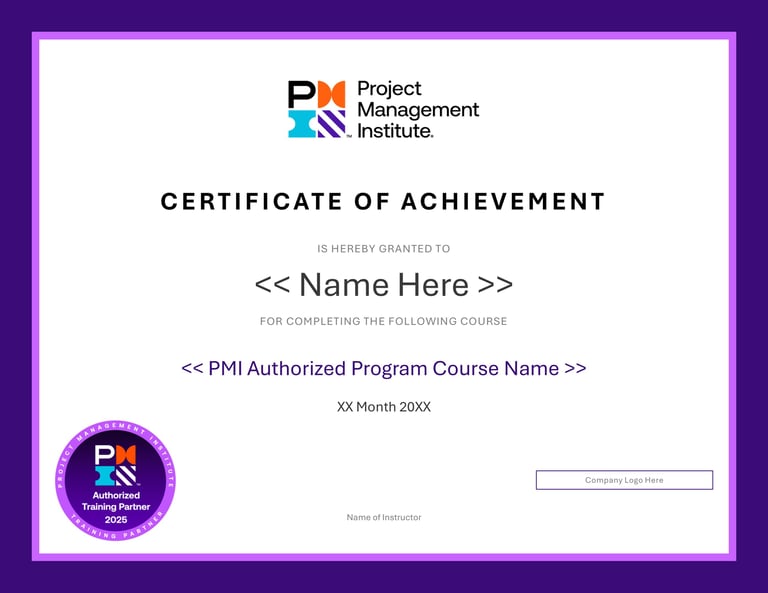

PMP Course Powered by GIMIT – PMI® Authorized Training Partner
🎯Course Description:
Ready to transition from managing single projects to leading complex strategic initiatives? GIMIT, an authorized training partner of PMI, offers a comprehensive PMP course specifically designed for experienced project managers aspiring to become Program Management Professionals.
This project management professional course goes beyond traditional project management, focusing on the intricacies of overseeing multiple, interdependent projects to achieve larger organizational objectives. You'll gain mastery in:
Program Lifecycle Management: Understand the entire journey of a program from initiation to closure.
Stakeholder Engagement: Learn advanced techniques for effectively managing diverse stakeholders across various projects.
Program Governance: Develop skills in establishing and maintaining robust governance frameworks.
Benefits Realization: Master the art of delivering tangible benefits and value aligned with strategic goals.


PMP Course Powered by GIMIT – PMI® Authorized Training Partner
🎯 Course Objectives:
This comprehensive project management professional course is meticulously designed to equip you with the advanced skills and knowledge essential for excelling in program leadership. Building upon your existing PMP course foundations, this program empowers you to strategically manage complex initiatives and drive organizational success.
Upon successful completion of this project management professional PMP course, participants will be able to:
Understand and apply the core concepts, principles, and processes of effective program management.
Strategically align programs with organizational objectives and contribute to the realization of long-term business goals.
Develop and implement robust program governance frameworks to ensure oversight, decision-making, and control across multiple projects.
Master the identification, planning, and delivery of program benefits, ensuring measurable value creation for the organization.
Effectively engage and manage diverse program stakeholders, fostering collaboration and mitigating potential conflicts.
Lead and direct cross-functional teams and project managers within a complex program environment.
Manage program risks, issues, and changes proactively to ensure program stability and successful outcomes.
Navigate the financial aspects of programs, including budgeting, forecasting, and tracking financial performance.
Enhance their leadership and communication skills essential for guiding large-scale initiatives.
Confidently prepare for and successfully pass a recognized Program Management Professional certification exam, leveraging the thorough PMP exam prep strategies embedded within this program.
Elevate your career and become a strategic asset to your organization with GIMIT's advanced PMP course for program management.

Upcoming Bootcamps
Explore Our upcoming Bootcamps
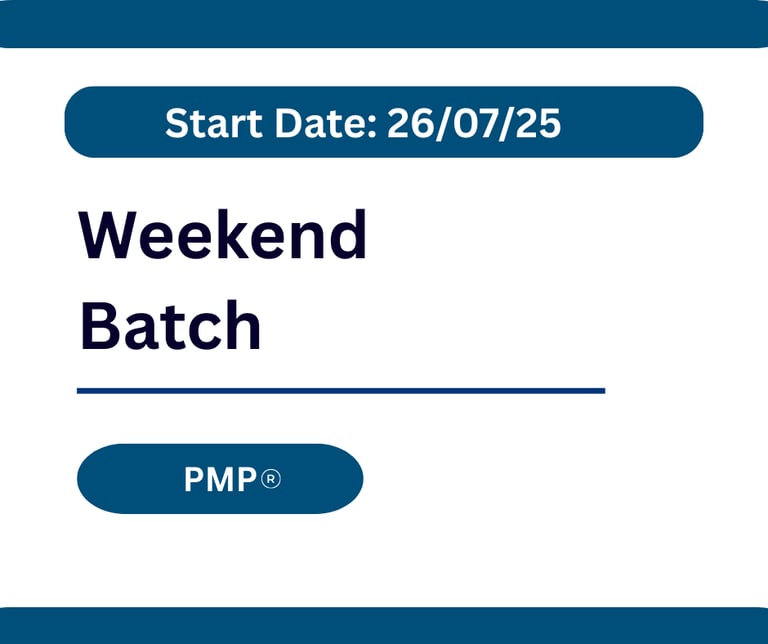

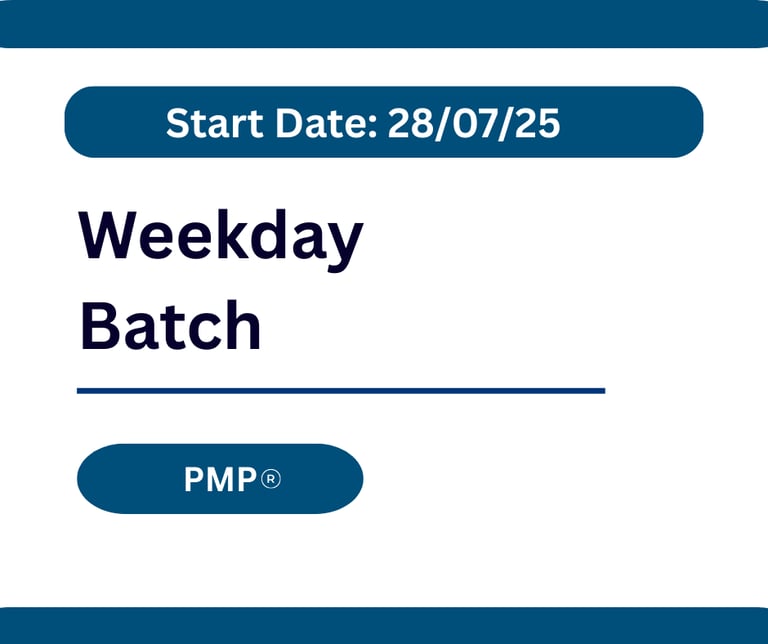

This comprehensive curriculum is designed to provide participants with an in-depth understanding of program management principles, processes, and practices, effectively preparing them for leadership roles and a professional certification. Our PMP course curriculum is structured to build upon existing project management knowledge and elevate your skills to the program level.
Module 1: Introduction to Program Management
What is Program Management? Definition and purpose.
Distinction between Projects, Programs, and Portfolios.
The Strategic Role of Program Management in Organizations.
Key Program Management Principles and Concepts.
The Value of Program Management Professional Certification.
Module 2: Program Strategy Alignment
Connecting Programs to Organizational Strategy and Objectives.
Strategic Planning and Program Selection.
Developing the Program Charter and Vision.
Understanding the Program Environment and Context.
Module 3: Program Benefits Management
Defining and Identifying Program Benefits (Tangible and Intangible).
Benefits Realization Management Process.
Benefits Register and Measurement Techniques.
Sustaining Program Benefits Post-Closure.
Module 4: Program Life Cycle Management
Overview of the Program Life Cycle Phases (e.g., Program Definition, Benefits Delivery, Program Closure).
Activities and Deliverables within each Program Phase.
Program Milestones and Gates.
Transitioning Projects into a Program.
Module 5: Program Governance
Establishing a Robust Program Governance Framework.
Roles and Responsibilities in Program Governance (e.g., Program Steering Committee, Program Sponsor).
Decision-Making Processes and Escalation Paths.
Ensuring Compliance and Adherence to Standards.
Module 6: Program Stakeholder Engagement
Identifying and Analyzing Program Stakeholders.
Developing a Comprehensive Stakeholder Engagement Strategy.
Managing Stakeholder Expectations and Communications.
Conflict Resolution and Negotiation in Programs.
Module 7: Program Financial Management
Program Budgeting and Funding Mechanisms.
Cost Estimation and Control at the Program Level.
Financial Reporting and Performance Monitoring for Programs.
Value Management and ROI in Program Management.
Module 8: Program Risk Management
Identifying and Assessing Program-Level Risks.
Developing Program Risk Response Strategies.
Program Issue Management and Resolution.
Contingency Planning and Reserve Management.
Module 9: Program Schedule and Resource Management
Developing and Managing the Integrated Program Schedule.
Resource Planning and Allocation across Program Components.
Optimizing Resource Utilization and Addressing Constraints.
Interdependencies Management between Projects.
Module 10: Program Communications and Information Management
Developing a Program Communication Plan.
Effective Communication Channels and Techniques.
Managing Program Information Flow and Documentation.
Reporting Program Performance to Stakeholders.
Module 11: Program Quality and Procurement Management
Establishing Quality Standards for Program Deliverables.
Quality Assurance and Control Processes in Programs.
Program Procurement Strategies and Contract Management (if applicable).
Module 12: Program Leadership and Team Management
Leadership Styles and Best Practices for Program Managers.
Building and Motivating High-Performing Program Teams.
Conflict Management and Coaching within Programs.
Ethical Considerations in Program Management.
Module 13: Program Performance and Change Management
Monitoring and Controlling Program Performance Metrics.
Integrated Change Control Processes for Programs.
Performance Reporting and Corrective Actions.
Program Review and Audit Processes.
Module 14: Program Closure
Formal Program Closure Procedures.
Transitioning Program Deliverables and Benefits.
Capturing Lessons Learned and Best Practices.
Final Program Reporting and Documentation.
Module 15: Certification Exam Preparation & Review
Comprehensive Review of all Program Management Domains, directly complementing your PMP course knowledge.
Exam Strategies and Techniques.
Practice Questions and Mock Exams.
Tips for Time Management and Addressing Challenging Questions.
Discussion on Application Process and Eligibility (General Guidance).
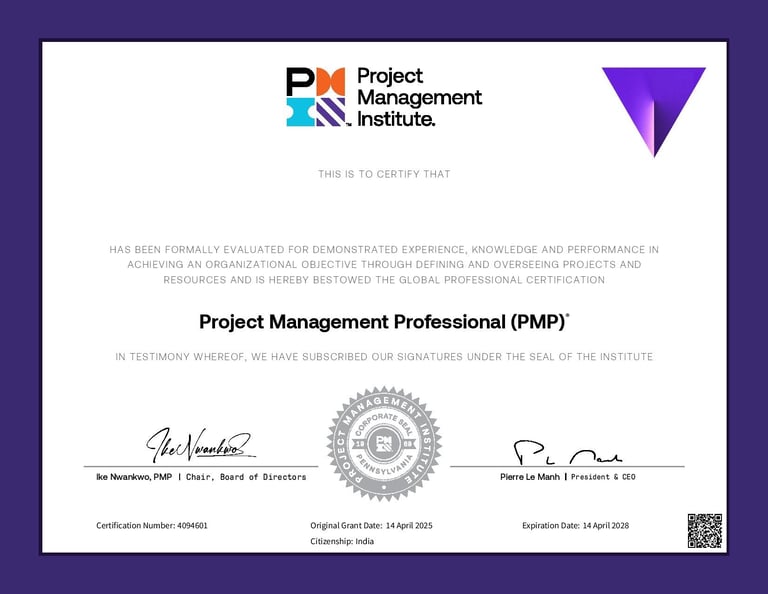

Course Content
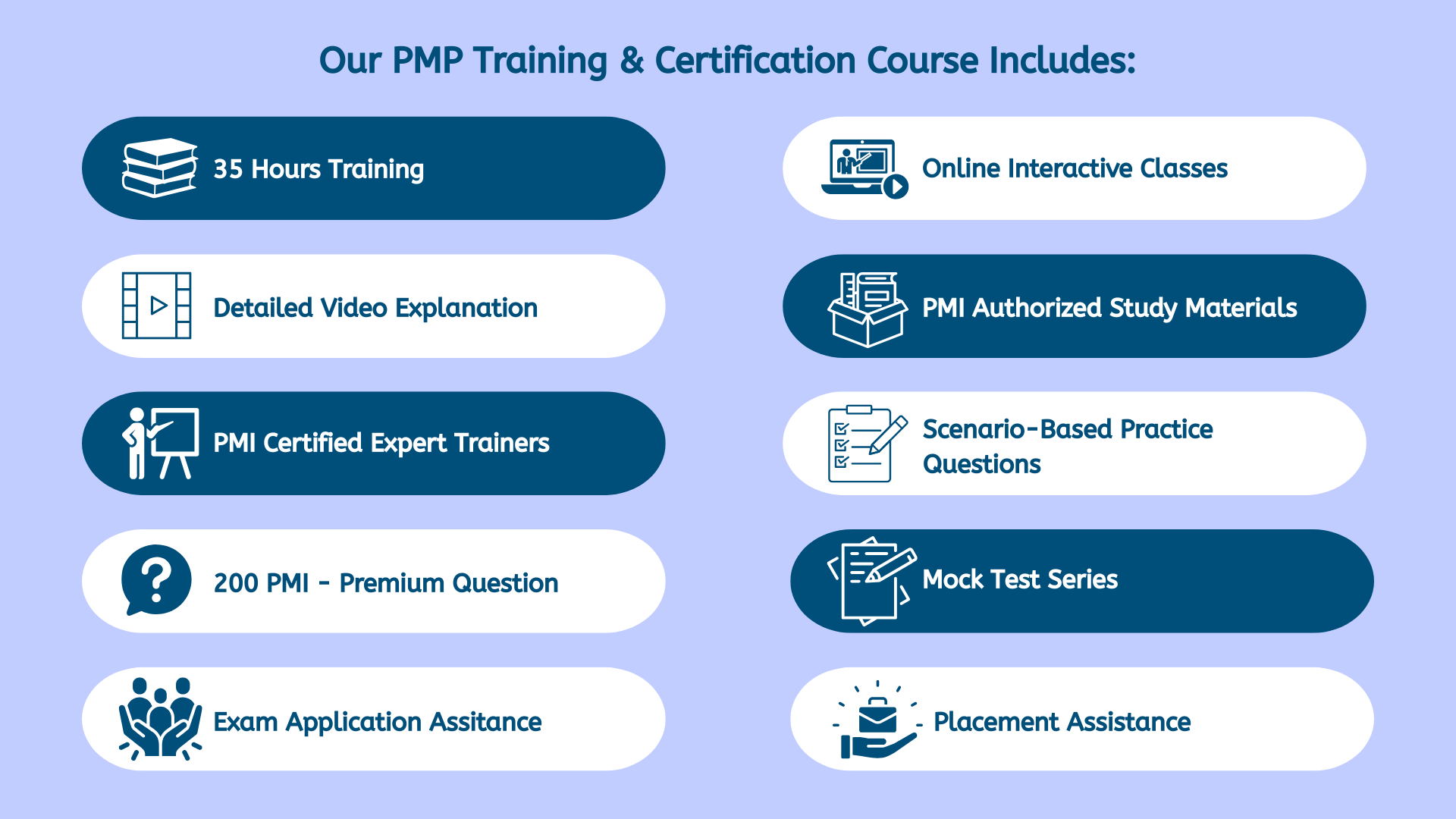
Pearson Vue conduct Exam of PMP
PMP (Project Management Professional) is a globally recognized certification offered by the Project Management Institute (PMI).
Pearson VUE is the official testing partner that conducts the PMP exam.
You can take the PMP exam:
At a Pearson VUE test center (in person), or
Online through Pearson VUE’s OnVUE system (remotely proctored).
After your PMP application is approved by PMI, you can schedule the exam on the Pearson VUE website.
The exam consists of 180 questions and lasts about 4 hours.
You need a quiet environment, a valid ID, and a computer with internet for the online exam.
🧠 Key Topics Covered:
Project Life Cycle & Development Approaches (Agile, Predictive, Hybrid)
Project Integration, Scope, Schedule, Cost, Quality, and Risk Management
Leadership Styles, Servant Leadership & Emotional Intelligence
Communication and Stakeholder Management
Agile & Scrum Fundamentals
Change Management and Governance
Tailoring project management based on project context
Ethical considerations and PMI Code of Ethics


🧾 Certification Eligibility:
✅ Eligibility Criteria (Choose One):
Option 1:
Secondary degree (high school diploma)
5 years (60 months) of project management experience
35 hours of project management education/training.
Option 2:
Four-year degree (bachelor’s or global equivalent)
3 years (36 months) of project management experience
35 hours of project management education/training
GIMIT’s PMP course fulfills the 35 contact hours requirement.


Success Stories of our Students
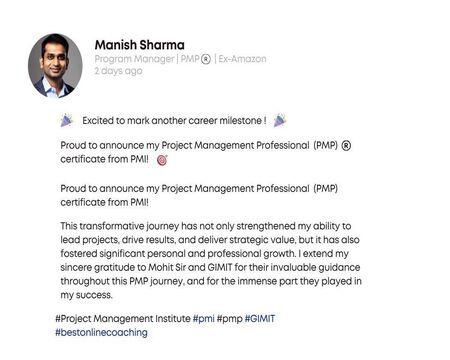

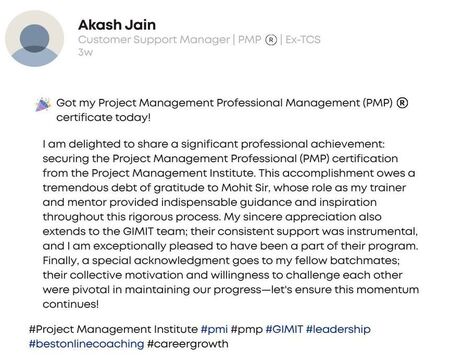

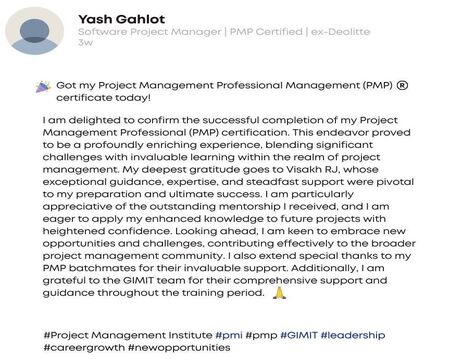

WHY - GIMIT
As an Authorized Training Partner (ATP) of PMI®, GIMIT ensures you receive the highest quality PMP® training aligned with the latest PMI standards. Our expert instructors, PMI-approved course materials, and exam-focused strategies are designed to boost your confidence and help you clear the PMP® exam on your first attempt. With GIMIT, you're not just preparing for an exam—you're building a future in project management excellence.
ATP & PMP - Credly Certify
Recognized by PMI® and verified on Credly, GIMIT delivers trusted, official PMP® training to help you succeed with confidence. To find one, visit the official PMI ATP Directory.


PMI Authorized Instructors
At GIMIT, our trainers are PMI® certified professionals whose credentials can be verified on Credly, ensuring you receive authentic, high-quality PMP® training from recognized experts.
With a PMI® Certified Instructor and an Authorized Training Provider (ATP) at GIMIT, you're guided by the best in the field—ensuring a clear, structured, and effective path to PMP® certification success.
PMP - Certificate
📚 FAQs – PMP Certification Training at GIMIT
1. Who should attend this course?
This course is ideal for experienced project managers, team leads, product managers, program managers, and anyone aiming to gain a globally recognized PMP® credential.
2. What makes GIMIT’s PMP training unique?
As a PMI Authorized Training Partner, GIMIT delivers the official PMP content with certified instructors, mock exams, and exam readiness strategies. You also receive official PMI courseware.
3. What are the 3 domains covered in the PMP exam?
The PMP exam covers People (42%), Process (50%), and Business Environment (8%) as per PMI’s latest Exam Content Outline (ECO).
4. Will this course prepare me for both Agile and Predictive methodologies?
Yes. The course covers Agile, Predictive, and Hybrid approaches, making you versatile across methodologies.
5. How long is the PMP training?
Typically, it spans 4 to 6 days in a bootcamp format or over weekends/evenings for working professionals. We also offer self-paced and blended options.
6. What if I miss a session?
You’ll get access to recorded sessions and can attend a future live session at no additional cost.
7. Will I get help with the PMP exam application?
Absolutely! We provide PMP application assistance including guidance on documenting your experience and writing project descriptions.
8. Is the PMP exam fee included?
No. The exam fee is paid directly to PMI. As of now, it is $405 for PMI members and $555 for non-members.
9. What is the passing score for PMP?
PMI does not disclose an exact passing score. However, you need to demonstrate proficiency across all domains in the exam.
10. Is the PMP certification valid for life?
No. The PMP certificate is valid for 3 years, and you can renew it by earning 60 PDUs (Professional Development Units).
